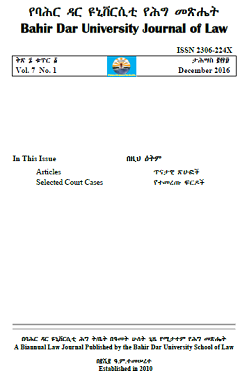Expropriation of Urban Lands and its Implications for Tenure Security of Old Possessors
Abstract
One of the major issues that have come along with the re-enactment of the Ethiopian Urban Land Lease Proclamation Number 721/2011and that have triggered immense fear and worry among the public has been the clear determination of the government to convert all old possessions into a leasehold system. When an inquiry is made into the property right to land that old possessors acquired before and after the introduction of the leasehold system, and the implication of this proclamation is scrutinized in light of tenure security, there are issues that in fact are of great concern for old possessors. The most important issue that is underscored in this article is the dilemma that old possessors confront with regard to expropriation of old possession for ‘public purpose’. Accordingly, old possessions could easily be expropriated by land administrative organs under the guise of ‘public purpose’ which is stated broadly, and old possessors could also be given a substitute plot of land which is far smaller than its former size. They could also be given a substitute plot of land which is lower than its former grade and which is located in the outskirts of urban centers that may have the effects of disrupting social ties and the already established business activities of old possessors. Except for claims for compensation, old possessors are also prohibited from lodging an appeal to regular courts against any decisions of land administrative organs connected with issues of the law and claims for a substitute of a plot of land. The outcome of all these problems is nothing but to exacerbate the situation and to make old possessors live under acute conditions of tenure insecurity until the overall conversion of old possession into leasehold system is completed. This article will try to analyze those legislations dealing with expropriation of old possessors in light of tenure security issues.
